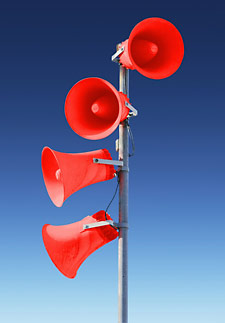
Just how much influence did the voting choices of committed evangelical Christian and Roman Catholic voters have upon the final results in the recent Australian and US elections?
In both countries post-mortem comments by media analysts have seen them pondering the rise of the so-called "fundamentalist right'. In Australian pre-polling comment, Christian voting intentions, as a significant bloc, barely rated a mention.
In the US of course it is somewhat of a different matter for there are many US evangelical and Roman Catholic organisations prominent in the political arena.
"By denying the importance to most Australians of moral values based on religious belief and tradition, politicians and opinion shapers make room for politico-religious splinter groups," wrote veteran columnist Frank Devine in The Australian. "Even worse for the politicians, continuing to turn a deaf ear will probably lead to defeat."
But some people seem to have heard the message. Family First, virtually unknown around Australia, except South Australia, before the election, have their first senator, in Victoria. The pity of that vote is that former Labor senator Jacinta Collins lost her seat, and she is a committed right-wing Roman Catholic whose expressed views often accorded with biblically based Protestants " this was notable in the federal parliamentary voting on human embryo research.
Jim Wallace from the Canberra-based Australian Christian Lobby wrote "One of the big stories of this election is that Christians have had a significant impact on the result." He added, "Whether Labor underestimated or just ignored the awakening of this constituency is a matter for its [election] post-mortem."
Already many Aussie commentators have deplored the growing presence of Christians and Christian based groups in our political arena. Religion, they say, must be kept out of politics. They seem to have no problem with the pseudo-politico environmental platform of the Greens and other extreme leftists, but anything that smacks of the Christian religion is downplayed or ignored.
Of course this can result in great effect if religious leaders don't overuse their moves into the political arena. If they speak judiciously and at a strategic time their message will be heard everywhere.
Whatever readers think of the statement on Labor's proposed education policy from Cardinal Pell, and Archbishops Jensen, Hart and Watson, no one can claim it disappeared without trace into media WPBs.
Of course the US political scene is different. There, people standing for election make their religious commitments quite clear, and religious leaders are known to advise their adherents on how to vote.
For example, in October, Wisconsin Roman Catholic Bishop David Zubik issued a note on church bulletins dismissing any distinction between faith and public life.
"Some political figures in this election have asserted that there is a natural divide between their religious beliefs and their political views," he wrote. "I argue this is patently false. [It] goes against the fabric of what it means to be a person of faith."
With religious leaders and religious based groups prepared to go that far in the US election campaign, is it any wonder that many US commentators in their post-mortems on the election result are declaring that evangelical Christians and Roman Catholics pushed President Bush over the line towards his second term?
In 11 US States a referendum was conducted with the Presidential vote. It called for an amendment that said marriage was only appropriate between a man and a woman. This was passed in all 11 states, and by over 60 per cent in ten of them.
"It is clear one of the major factors in this presidential race was the strong turnout of the faith and pro-life communities," Rev Patrick Mahoney, director of the Christian Defense Coalition said. "Moral issues played a major role across the country."
Influence when it comes is often overplayed. If Christian groups and leaders now have more political ears listening when they speak in this country, then they must be careful to use their opportunities to support biblically authenticated opinions and actions. Political moves that have respect for human life and dignity; policies that are family friendly and protective of children, these are what Christians must call for from politicians.
But as the Wisconsin bishop said, we cannot leave God outside when we vote. No Christian can be a Christian and faith-value neutral in their politics. To do so would be to deny their whole life commitment to the God who is Creator and Saviour.
There are Christian politicians in the major political parties. We should not be surprised to find them there, and we should rejoice in their presence, for God does not leave himself without witness anywhere. Pray for them regularly asking that they may be given the wisdom that comes from above to aid them in their work, for the good of this nation, and for the glory of God.























